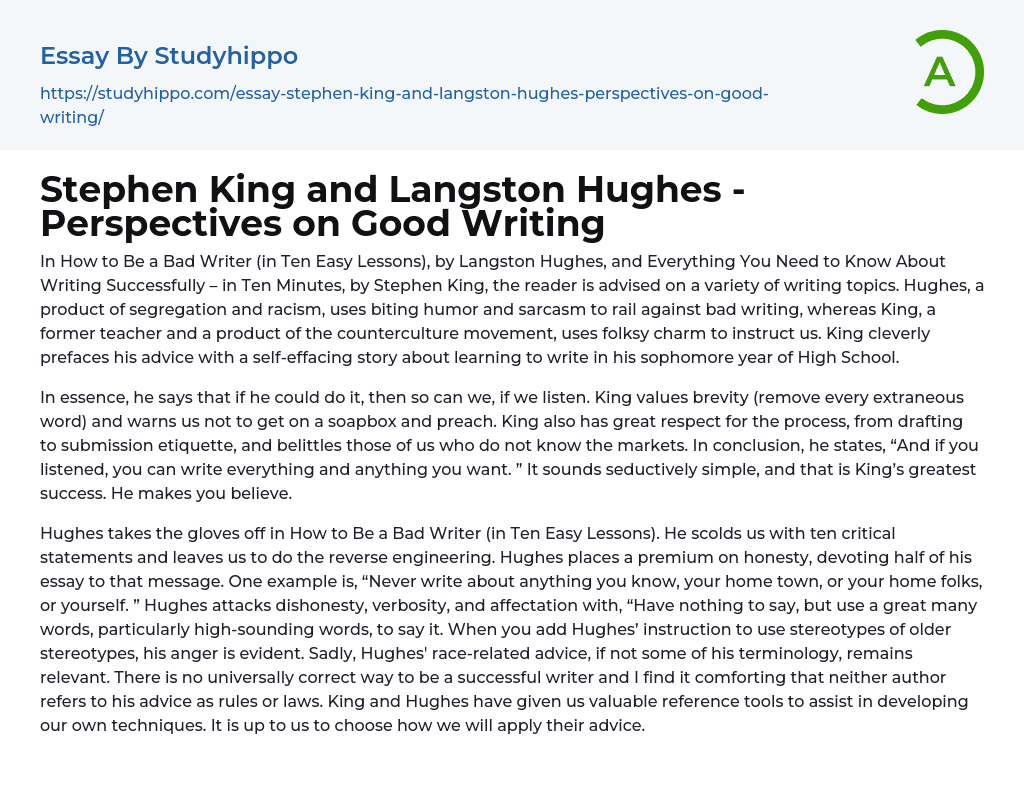

Stephen King and Langston Hughes – Perspectives on Good Writing Essay Example
In How to Be a Bad Writer (in Ten Easy Lessons), by Langston Hughes, and Everything You Need to Know About Writing Successfully – in Ten Minutes, by Stephen King, the reader is advised on a variety of writing topics. Hughes, a product of segregation and racism, uses biting humor and sarcasm to rail against bad writing, whereas King, a former teacher and a product of the counterculture movement, uses folksy charm to instruct us. King cleverly prefaces his advice with a self-effacing story about learning to write in his sophomore year of High School.
In essence, he says that if he could do it, then so can we, if we listen. King values brevity (remove every extraneous word) and warns us not to get on a soapbox and preach. King also has great respect for the process, from drafti
...ng to submission etiquette, and belittles those of us who do not know the markets. In conclusion, he states, “And if you listened, you can write everything and anything you want. ” It sounds seductively simple, and that is King’s greatest success. He makes you believe.
Hughes takes the gloves off in How to Be a Bad Writer (in Ten Easy Lessons). He scolds us with ten critical statements and leaves us to do the reverse engineering. Hughes places a premium on honesty, devoting half of his essay to that message. One example is, “Never write about anything you know, your home town, or your home folks, or yourself. ” Hughes attacks dishonesty, verbosity, and affectation with, “Have nothing to say, but use a great many words, particularly high-sounding words, to say it. When
you add Hughes’ instruction to use stereotypes of older stereotypes, his anger is evident. Sadly, Hughes' race-related advice, if not some of his terminology, remains relevant. There is no universally correct way to be a successful writer and I find it comforting that neither author refers to his advice as rules or laws. King and Hughes have given us valuable reference tools to assist in developing our own techniques. It is up to us to choose how we will apply their advice.
- Aldous Huxley essays
- Alice Walker essays
- Amy tan essays
- Anne Bradstreet essays
- Anton Chekhov essays
- Arthur Miller essays
- Augustine essays
- Bertolt Brecht essays
- Booker T Washington essays
- Carol ann duffy essays
- Charles Dickens essays
- Charlotte Perkins Gilman essays
- Chinua Achebe essays
- Christina Rossetti essays
- Consider The Lobster essays
- Edgar Allan Poe essays
- Elizabeth Bishop essays
- Emily Dickinson essays
- Ernest Hemingway essays
- F. Scott Fitzgerald essays
- George Orwell essays
- Harper Lee essays
- Homer essays
- James Baldwin essays
- Jane Austen essays
- John Donne essays
- John Steinbeck essays
- Kate Chopin essays
- Kurt Vonnegut essays
- Langston Hughes essays
- Leonardo Da Vinci essays
- Mark Twain essays
- Mary Shelley essays
- Maya Angelou essays
- Nathaniel Hawthorne essays
- Oscar Wilde essays
- Percy Bysshe Shelley essays
- Peter Skrzynecki essays
- Phillis Wheatley essays
- Poets essays
- Ralph Waldo Emerson essays
- Ray Bradbury essays
- Richard Rodriguez essays
- Robert Browning essays
- Robert Frost essays
- Robert Louis Stevenson essays
- Seamus Heaney essays
- Sherman Alexie essays
- Sophocles essays
- Stephen King essays



